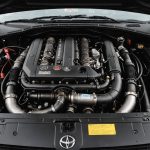In a world increasingly aware of environmental concerns, vehicle emissions standards are growing in importance. In the United Kingdom, laws and regulations have been implemented to strictly control vehicle modifications, in an effort to reduce harmful emissions and maintain air quality standards. In London, for instance, the Ultra Low Emission Zone (ULEZ) standards are particularly stringent. For those of you keen on personalising your cars with modifications, it is essential to understand what is and isn’t legal, and the potential consequences of non-compliance. This article delves into the intricate world of vehicle modifications in the UK, their legal landscape, and the potential fallout of disregarding these laws.
Understanding ULEZ and Vehicle Emission Standards
The ULEZ is a specific area in London where vehicles are required to meet certain stringent emissions standards or face a daily charge. The zone operates 24 hours a day, seven days a week, excluding Christmas Day. The key motive behind ULEZ is to improve air quality by reducing the number of polluting vehicles on the road.
In the same genre : How to choose the right winter tires for your vehicle in the UK?
Cars, vans, minibuses, buses, coaches, and heavy goods vehicles (HGVs) are all subject to ULEZ standards. To be deemed compliant, these vehicles must meet specific exhaust emission standards. The focus is on limiting the emissions of Nitrogen Oxides (NOx) and particulate matter, both of which contribute to air pollution and have an adverse effect on public health.
If your vehicle doesn’t meet these standards, you’ll be required to pay a daily ULEZ charge. This is in addition to any Congestion Charge that may apply. Failure to pay the ULEZ charge results in a hefty fine, which can be a nasty surprise for those unaware of these regulations.
Also to read : What are the key differences between petrol and diesel engines in the UK?
Legal and Illegal Vehicle Modifications
Vehicle modifications can range from simple aesthetic changes to comprehensive engine overhauls. While the law doesn’t prevent you from modifying your car, certain alterations can render your vehicle non-compliant with ULEZ standards, invalidate your insurance, or even make your vehicle illegal to drive.
Emission-related modifications, such as changes to the exhaust system or engine, can potentially conflict with ULEZ standards. Removing or tampering with the catalytic converter, for instance, can result in increased emissions, pushing your vehicle into the non-compliant category.
On the other hand, simple aesthetic modifications, such as a new paint job or adding non-structural elements like spoilers, are typically legal provided they don’t obscure the driver’s view or pose a risk to other road users. However, even these need to be notified to your insurance provider to ensure your policy remains valid.
Consequences of Non-Compliance with Emission Standards
Driving a vehicle that doesn’t comply with ULEZ or other emission standards can have serious consequences. First and foremost, you will be liable for the daily ULEZ charge, currently set at £12.50 for most vehicle types including cars, motorcycles and vans, and £100 for heavier vehicles, including lorries.
Failure to pay the charge can result in a significant penalty. The fine is £160 for most vehicles, but this can be reduced to £80 if you pay within 14 days. For heavier vehicles, the penalty is £1000, reduced to £500 if paid within 14 days.
Besides the financial penalty, driving a non-compliant vehicle can also lead to points on your licence, which can increase your insurance premium and potentially result in the loss of your driving licence with enough accumulated points.
Non-Compliant Vehicle Modifications and Insurance
When you modify your vehicle, it’s crucial to inform your insurance provider, as failing to do so can invalidate your policy. This means that in the event of an accident, your insurance company could refuse to cover the damage or injury costs, leaving you to foot the bill.
Even legal modifications can significantly impact your insurance premiums. Insurers base their rates on the vehicle’s risk level, and modifications can alter this risk. For example, engine modifications that increase speed and performance can lead to higher premiums due to the increased risk of accidents.
Also, vehicles with modifications may be more attractive to thieves, again hiking up your insurance costs. Therefore, although modifying your car may seem like a fun way to express your personality or improve its performance, it’s necessary to consider the potential legal and financial implications.
The Impact of Car Modifications on Number Plates and Tinted Windows
Moving beyond engine and emission-related modifications, other changes to your vehicle can also cause non-compliance issues. Two often overlooked areas are number plates and tinted windows.
In the UK, car number plates must conform to a specific design standard, comprising the correct colour, size, and typeface. Altering the design of the number plate beyond the legal guidelines is a modification that can result in penalties. Custom plates or ‘show plates’ are not permitted on UK roads and can earn you a £1000 fine. Remember, the law requires your number plates to be readable and recognisable at all times.
With regard to window tinting, UK law specifies that the front windscreen and front side windows must allow at least 75% and 70% light transmission respectively. While many people opt for tinted windows for privacy, aesthetic, or UV protection reasons, overly dark tinting is deemed illegal. It can result in penalties and the police or DVLA can also demand the removal of the tint.
Being aware of the specific requirements for number plates and tinted windows is crucial for vehicle owners who want to avoid the fines, points on their license, and potential insurance complications that come with non-compliance.
The ULEZ Compliance Grace Period for Diesel and Petrol Cars
In a bid to encourage vehicle owners to comply with emissions standards, the ULEZ scheme offers a ‘grace period’ for diesel and petrol cars. This period allows car owners to upgrade their vehicle to a ULEZ compliant one or make the necessary modifications to meet ULEZ standards.
For diesel cars, this grace period is until September 2020 for residents, while for petrol cars, the date extends to October 2025. After these dates, if your car does not meet the ULEZ emissions standards, you’ll be required to pay the daily ULEZ charge.
This grace period is a fantastic opportunity for car owners to ensure their vehicle meets the ULEZ requirements without the immediate financial sting of the daily charge or the risk of non-compliance fines. However, once the grace period ends, vehicle owners must ensure their vehicle complies with ULEZ standards or face the applicable consequences.
Conclusion: Ensuring your Vehicle Modifications are Legal and ULEZ Compliant
Understanding the rules and regulations surrounding vehicle modifications in the UK can be complex, but it’s crucial for vehicle owners to stay informed to avoid penalties and maintain compliant vehicle status.
Whether you’re considering engine modifications, aesthetic changes, or even altering your number plates or tinting your windows, remember that any modifications should meet the standards set by the ULEZ and other emissions regulations.
While some modifications can enhance the performance or look of your vehicle, it’s essential to consider the potential implications on your car insurance premiums and the legalities of the modification. Failure to comply with regulations not only results in financial penalties but can also impact your driving license and insurance coverage.
In conclusion, while vehicle modifications can be a great way to personalise your car, it’s vital to do so responsibly, ensuring all changes meet the ULEZ and UK laws to maintain air quality and protect public health. It’s not just about avoiding penalties – it’s about contributing to a greener and healthier environment.










